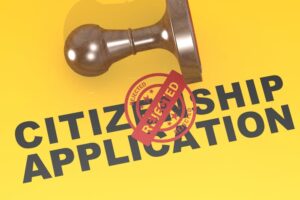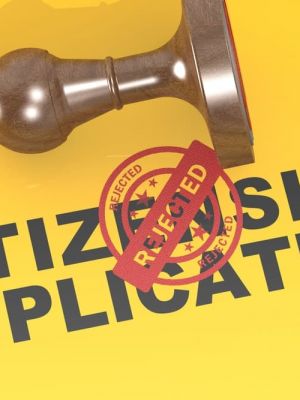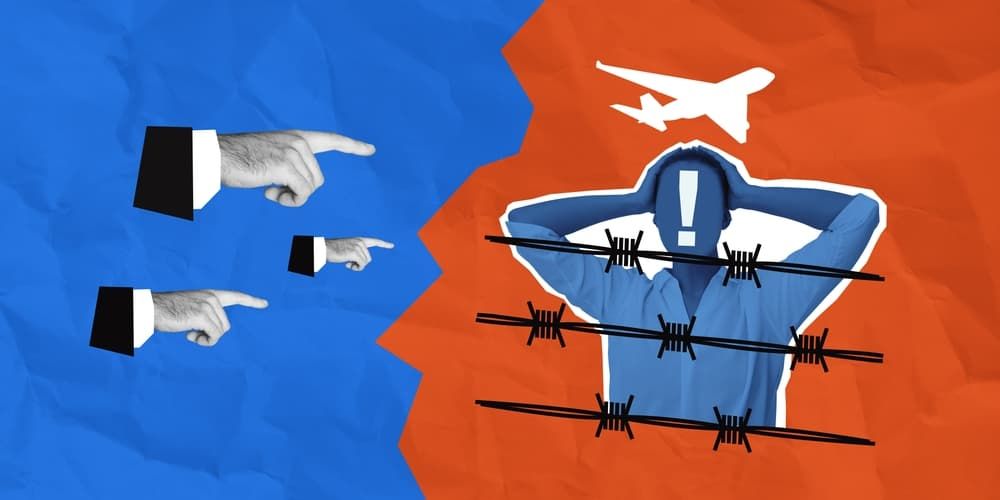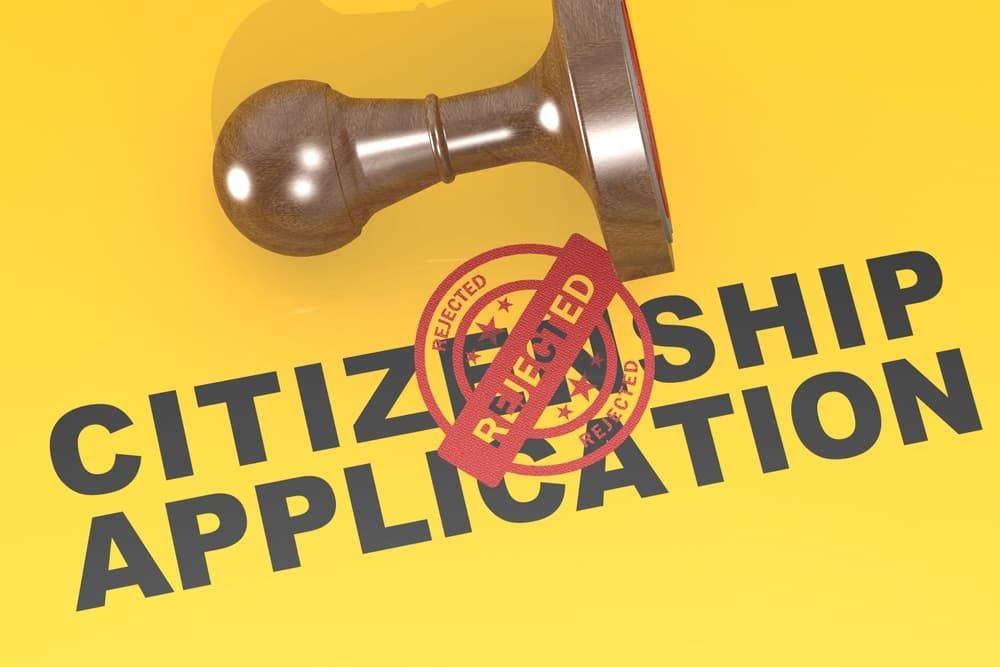What Are the Common Reasons for Citizenship Denial?
The most common reasons for citizenship denial include criminal record issues affecting good moral character, continuous residence breaks from long trips abroad, physical presence shortfalls, unpaid taxes or child support, selective service non-registration, and misrepresentation on naturalization applications.
U.S. Citizenship and Immigration Services (USCIS) reviews N-400 naturalization applications thoroughly, examining applicants’ backgrounds over the required three or five-year period before filing. Massachusetts residents seeking U.S. citizenship face specific eligibility requirements, and understanding common denial reasons helps prepare stronger applications and address potential issues before they become problems.
Overview of Common Reasons for Citizenship Denials
- Good moral character violations, including criminal convictions, DUIs, domestic violence, and drug offenses, are leading causes of N-400 denials
- Continuous residence breaks from trips abroad lasting six months or longer can disrupt naturalization eligibility
- Tax compliance issues, such as unfiled returns, unpaid taxes, and a lack of payment plans, can lead to citizenship denials
- Failed English or civics tests don’t permanently bar citizenship, but require retesting within the same application period
- Misrepresentation or fraud on immigration applications can result in permanent bars to naturalization and potential removal proceedings
Good Moral Character Violations
 Good moral character represents the most scrutinized aspect of naturalization applications, covering the three years before filing for most applicants or five years for those married to U.S. citizens.
Good moral character represents the most scrutinized aspect of naturalization applications, covering the three years before filing for most applicants or five years for those married to U.S. citizens.
Criminal Convictions and Arrests
Criminal history creates the most common basis for citizenship denials. USCIS examines all arrests and convictions during the statutory period, even if charges were dismissed or records expunged. Certain crimes permanently bar naturalization, while others may be overcome with strong evidence of rehabilitation.
Aggravated felonies can create permanent bars to naturalization under federal immigration law. These include serious violent crimes, drug trafficking offenses, firearms violations, and fraud cases involving substantial monetary loss. Even single aggravated felony convictions prevent naturalization eligibility permanently.
Crimes involving moral turpitude (CIMT) include theft, fraud, domestic violence, and other offenses that reflect adversely on character. Multiple CIMT convictions or single convictions with sentences of one year or longer create significant obstacles to naturalization approval.
Domestic Violence and Family-Related Offenses
Domestic violence convictions receive particular scrutiny during naturalization review. These offenses demonstrate behavior inconsistent with good moral character expectations and often involve protective orders that complicate immigration status.
Child abuse, neglect, or abandonment cases raise serious good moral character concerns. USCIS examines family court records, protective orders, and child services involvement when evaluating these situations.
DUI and Traffic-Related Violations
DUI convictions within the statutory period may lead to citizenship denials, particularly when multiple offenses occur or when accidents cause injuries. Single DUI convictions may be overcome with evidence of alcohol treatment, community service, and rehabilitation efforts.
Driving while a license is suspended or without insurance may indicate disregard for law and order. Multiple traffic violations, suggesting a pattern of behavior, can negatively impact good moral character determinations.
While criminal history does not always automatically disqualify naturalization candidates, it requires careful documentation of rehabilitation efforts and positive character evidence.
Continuous Residence and Physical Presence Requirements
Continuous residence and physical presence requirements create technical barriers that result in citizenship denials.
Breaks in Continuous Residence
Continuous residence requires maintaining permanent resident status without breaks that disrupt the required three or five-year period. Trips abroad lasting six months or longer create presumptions of residence abandonment that applicants must overcome with evidence.
Trips lasting one year or longer automatically break continuous residence unless applicants obtain re-entry permits before traveling. These breaks restart the naturalization timeline, requiring new three- or five-year waiting periods.
Evidence of U.S. Ties During Travel
USCIS examines evidence of ongoing U.S. ties during extended trips abroad. Maintaining employment, family relationships, property ownership, and community involvement helps overcome travel-related residence challenges.
Tax filing requirements continue during extended travel periods. Failure to file U.S. tax returns while abroad may indicate residence abandonment and affect naturalization eligibility.
Physical Presence Calculations
Physical presence requires actual time spent within the United States during the statutory period. Applicants must demonstrate at least half the required period’s physical presence through passport stamps, travel records, and supporting documentation.
Short trips abroad don’t break continuous residence but reduce physical presence time. Frequent international travel may prevent meeting minimum physical presence requirements even when residence remains continuous.
Travel patterns should be reviewed carefully before filing naturalization applications to address potential residence or presence deficiencies.
Tax Compliance and Financial Obligations
Tax compliance represents a fundamental aspect of good moral character that USCIS reviews thoroughly during naturalization proceedings.
Unfiled Tax Returns and Payment Issues
All required federal and state tax returns must be filed for the statutory period before naturalization approval. Missing tax returns create presumptions against good moral character that require explanation and correction.
Unpaid tax obligations don’t automatically prevent naturalization if applicants have established payment plans with tax authorities. However, willful tax evasion or fraudulent returns create serious character concerns.
Child Support and Court-Ordered Payments
Unpaid child support obligations can lead to citizenship denials. USCIS requires current status on all court-ordered support payments and may deny applications when substantial arrearages exist without payment arrangements.
Court-ordered restitution, fines, and other financial obligations must be current or have approved payment plans. Willful non-compliance with court orders demonstrates poor moral character.
Documentation Requirements
Tax transcripts from the IRS provide official documentation of filing and payment history. USCIS may request multiple years of transcripts to verify compliance throughout the statutory period.
Payment plan agreements with tax authorities help demonstrate good faith efforts to resolve outstanding obligations. Current payment status documentation should accompany naturalization applications.
Financial obligation issues often can be resolved before filing naturalization applications, making advance planning beneficial.
Selective Service Registration Requirements
Males between the ages of 18 and 26 in the United States must register for Selective Service or provide evidence of exemption from registration requirements.
Registration Timeframes and Requirements
Selective Service registration must occur within 30 days of an 18th birthday for males residing in the United States. This requirement applies to permanent residents, undocumented individuals, and other non-citizens living in the U.S.
Failure to register when required creates presumptions against good moral character that may prevent naturalization approval. However, USCIS provides procedures for demonstrating that failure to register was not willful.
Exemptions and Documentation
Certain individuals are exempt from Selective Service registration, including those who were outside the United States during the entire 18-26 age period, those with continuous lawful status as non-immigrants, and individuals with specific disabilities.
Status Letter Requests from Selective Service provide official documentation of registration status or exemption grounds. These letters help clarify registration history and address potential concerns.
Addressing Non-Registration Issues
Non-registration due to lack of knowledge about requirements may be excused with proper documentation and explanation. Evidence of continuous residence outside the United States during the required age period supports exemption claims.
Religious or moral objections to military service don’t excuse registration requirements. However, conscientious objector status can be claimed during actual military service if called.
English and Civics Test Requirements
English and civics test failures represent common but often temporary obstacles to naturalization approval.
English Test Components
The English test includes speaking, reading, and writing components that evaluate practical communication skills. Speaking ability is assessed during the naturalization interview through normal conversation with USCIS officers.
Reading tests require applicants to read one to three sentences about American history or civics topics. Writing tests involve writing one to three sentences that officers dictate, focusing on vocabulary and grammar related to civics and history.
Civics Test Format and Content
The civics test covers U.S. history and government topics through up to 10 questions from a list of 100 possible questions. Applicants must answer six questions correctly to pass this portion of the naturalization test.
Recent changes to civics test formats and content affect preparation strategies. USCIS provides study materials and practice questions to help applicants prepare for both English and civics components.
Retesting Opportunities
Failed tests don’t result in immediate application denial. Applicants receive opportunities to retake failed portions during re-examination appointments typically scheduled 60-90 days after initial failures.
Multiple test failures may eventually lead to application denial, but most applicants receive at least two opportunities to demonstrate English and civics knowledge.
Test preparation resources and English language classes help address skill deficiencies before naturalization interviews.
Misrepresentation and Fraud Issues
Misrepresentation on naturalization applications or during immigration history creates serious grounds for citizenship denial and potential removal proceedings.
False Claims to U.S. Citizenship
False claims to U.S. citizenship for any purpose create permanent bars to naturalization eligibility. These claims include voting in federal elections, obtaining U.S. passports fraudulently, or claiming citizenship on employment or benefit applications.
Even inadvertent false claims may result in serious immigration consequences. Legal permanent residents should never claim U.S. citizenship on any documents or applications before naturalization completion.
Material Misrepresentation on Applications
Lying or omitting material facts on N-400 applications or during naturalization interviews can lead to denial and potential removal proceedings. All questions must be answered truthfully and completely.
Common misrepresentations include failing to disclose arrests, lying about travel history, omitting previous marriages, or providing false information about employment or residence history.
Document Fraud and Identity Issues
Using fraudulent documents to obtain immigration benefits creates grounds for citizenship denial and removal. This includes fake identification documents, fraudulent marriage certificates, or altered educational credentials.
Identity fraud involving use of another person’s identity or Social Security number creates serious immigration consequences that may permanently bar naturalization.
Misrepresentation issues often cannot be cured and may result in permanent immigration consequences beyond naturalization denial.
Appeal and Reapplication Options After Denial
Citizenship denials don’t permanently end naturalization prospects in most cases, though available remedies depend on specific denial grounds.
Post-denial options include:
- Form N-336 administrative appeals challenging denials within 30 days, reviewed by different USCIS officers who may reverse initial decisions
- Form I-290B motions to reopen when new evidence unavailable during initial review becomes available, with strict filing deadlines
- Reapplication with new N-400 forms after addressing the underlying issues that caused initial denials
- Waiting periods to resolve criminal cases, complete probation, or establish longer residence periods
- Legal consultation to evaluate strategies based on specific denial reasons and individual circumstances
Professional legal guidance can help you evaluate post-denial options and develop strategies for eventual naturalization approval. Depending on the specific grounds for denial, each approach has different timelines, costs, and success rates.
FAQ for Common Reasons for Citizenship Denial
What Are the Most Common Reasons USCIS Denies N-400 Applications?
The most common denial reasons include criminal history affecting good moral character, continuous residence breaks from extended travel abroad, unpaid taxes or child support, selective service non-registration for eligible males, and failed English or civics tests.
Can a DUI Conviction Prevent Naturalization Approval?
A single DUI conviction doesn’t automatically prevent citizenship, but multiple DUIs or DUIs causing injury create significant obstacles. USCIS evaluates rehabilitation efforts, community service completion, alcohol treatment participation, and overall conduct during the statutory period when making good moral character determinations.
Do Trips Abroad Lasting Six Months Break Continuous Residence?
Trips lasting six months to one year create presumptions of residence abandonment that must be overcome with evidence of ongoing U.S. ties. Trips over one year automatically break continuous residence unless re-entry permits were obtained before travel. Strong evidence of employment, family, and property ties helps overcome travel-related concerns.
Will Unpaid Taxes or Child Support Lead to Automatic Citizenship Denial?
Unpaid obligations don’t automatically cause denial if payment plans are established with appropriate authorities. However, willful non-compliance or substantial arrearages without payment arrangements demonstrate poor moral character. Current payment status and good faith efforts to resolve obligations are crucial factors.
What Happens if I Fail the English or Civics Test?
Test failures don’t immediately result in application denial. Applicants receive opportunities to retake failed portions during re-examination appointments, typically scheduled 60-90 days later. Multiple failures may eventually lead to denial, but most applicants get at least two testing opportunities.
Legal Help with Citizenship Applications and Denials
Proper preparation, documentation, and legal guidance can often address citizenship denials. In fact, many issues that cause denials are fixable with time and appropriate action.
If you meet basic eligibility requirements, you should not let fear of denial prevent you from pursuing citizenship. Proper preparation and legal counsel experienced in naturalization matters can overcome many perceived obstacles.
Brooks Law Firm is ready to help you understand your options and develop strategies for success. As “The Immigrants Law Firm,” we’re dedicated to helping immigrant communities achieve their citizenship goals. Our team speaks English, Spanish, and Portuguese, offering accessible legal support to our clients.
Contact a dedicated Immigration lawyer at Brooks Law Firm today at (617) 245-8090 for a free consultation about your naturalization case.




